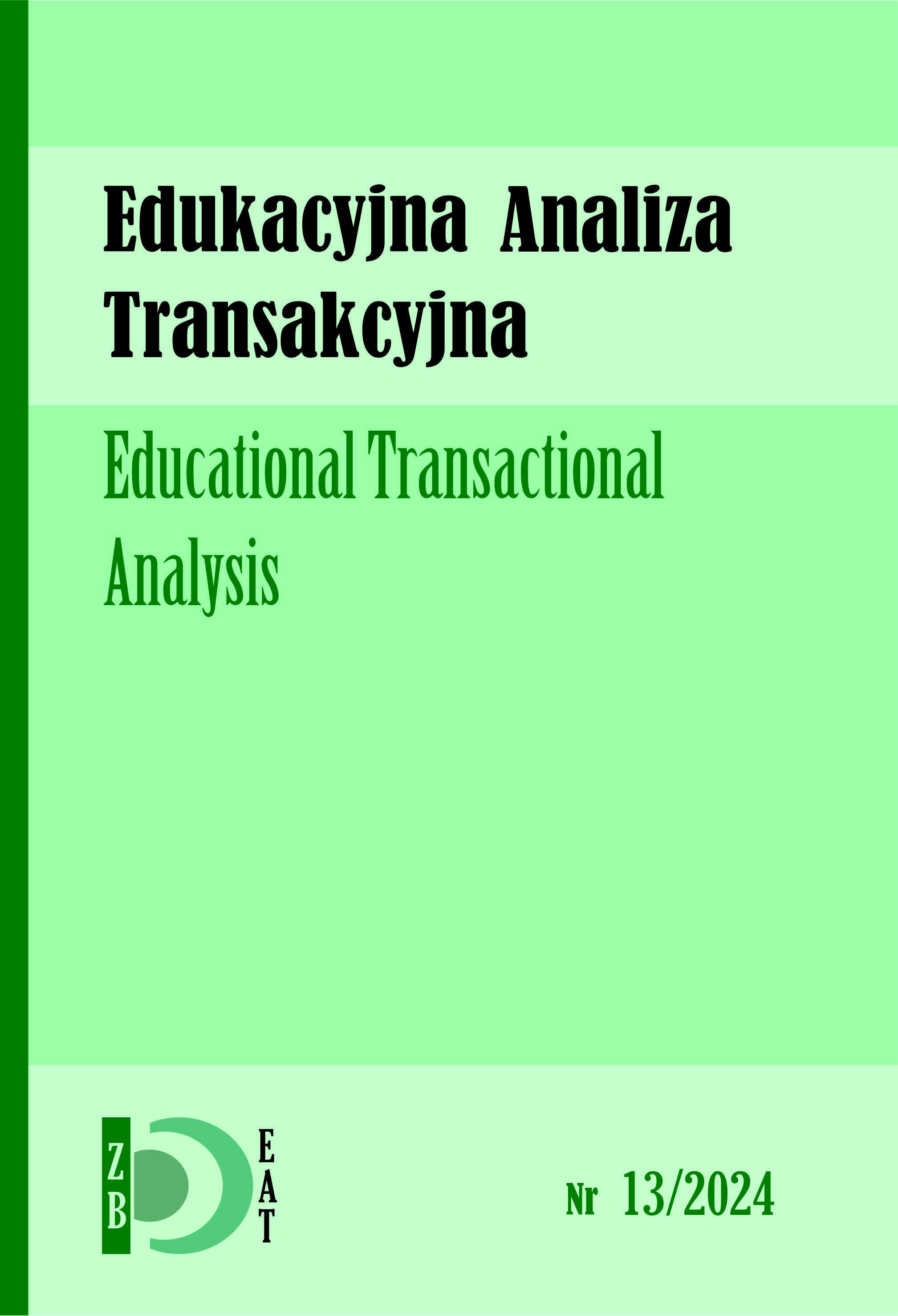Polish Educational Needs of Young Educators in the Context of Transactional Educational Hungers and in Relation to Professional Personality Types
DOI:
https://doi.org/10.16926/eat.2024.13.09Keywords:
transactional educational hungers, teacher, educational needs, professional personalityAbstract
This paper presents the results of research relating to the educational needs of young pedagogues in relation to their professional personality types. The research was conducted using the Questionnaire of Educational Needs (KPE) and the Holland Occupational Personality Test. Students of pedagogy at the Humanitas Academy in Sosnowiec and students of pedagogy, psycho-prevention and psychological support at the Jan Długosz University in Częstochowa were involved in this research. The KPE study showed a high level of student indications of hunger for recognition and stimulation. When analysing the students' research with the Holland Occupational Personality Test, results were obtained that clearly indicated a dominant social personality. A statistically significant relationship was observed between realistic style and hunger for stimulation, where the stronger the realistic style, the more stimulation it needs; artistic style and hunger for stimulation, where the stronger the artistic style, the more stimulation it needs; conventional style and hunger for structure, where the stronger the conventional style, the more structure it needs. Research into the individual differences of prospective teachers within their personality traits, coupled with an examination of their educational needs, can provide solutions to many educational problems, as well as pointing the way to better teacher education.
Downloads
References
Andrukowicz, W. (1998). Interakcja oparta na wzajemnym porozumieniu. Edukacja i Dialog, 4, 52–57. https://pedagogiczna.edu.pl/wp-content/uploads/2018/10/Idea-dialogu-w-edukacji.pdf?utm_source=chatgpt.com
Bajcar, B., Borkowska, A., Czerw, A., Gąsiorowska, A., & Nosal, C. (2006). Psychologia preferencji i zainteresowań zawodowych. Przegląd teorii i metod. Zeszyty Informacyjno-Metodyczne Doradcy Zawodowego, 34. Ministerstwo Pracy i Polityki Społecznej.
Berne, E. (1966). Principles of Group Treatment. Grove Press, Inc. https://psptraining.com/wp-content/uploads/Berne-E.-1966.-Principles-of-group-treatment.pdf
Cornell, W. F., de Graaf, A., Newton, T., & Thunnissen, M. (Eds.). (2016). Into TA: A comprehensive textbook on transactional analysis. Karnac Books Ltd. https://www.taylorfrancis.com/books/edit/10.4324/9780429476143/ta-william-cornell
Dworzańska, M. (1998). Dopasowanie do środowiska pracy tv teorii Hollanda na przykładzie zawodu nauczyciela, In T. Rongińska, W. Gaida et al. (Eds.), Zdrowie psychologiczne w zawodzie nauczycielskim, Materiały międzynarodowej konferencji naukowej, Zielona Góra-Potsdam.
Holland, J. L. (1992). Making vocational choices: A theory of vocational personalities and work environments. Psychological Assessment Resources. https://www.proquest.com/docview/205130022?sourcetype=Scholarly%20Journals (accessed July 1, 2024).
Jagieła, J. (2017). Samoświadomość nauczycieli w koncepcjach edukacyjnej analizy transakcyjnej. Prace Naukowe Akademii im. Jana Długosza w Częstochowie. Pedagogika, 26(1), 69–83. https://doi.org/10.16926/p.2017.26.06
Jagieła, J. (2018). Edukacyjna analiza transakcyjna na tle innych orientacji psychopedagogicznych. Wydawnictwo UJD.
Jones, V. F., & Jones, L. S. (2012). Comprehensive classroom management: Creating communities of support and solving problems (10th ed.). Pearson.
Jones, N., & Youngs, P. (2012). Attitudes and affect: Daily emotions and their association with the commitment and burnout of beginning teachers. Teachers College Record, 114(2), 1–36. https://doi.org/10.1177/016146811211400203
Kenney, W. J., & Lyons, B. F. (1979). Naturally occurring teacher ego state behaviors. Transactional Analysis Journal, 9(4), 297–300.
Miecznik-Warda, J., & Kovalčíková, I. (2022). Szybkość motoryczna i szybkość umysłowa jako wyznaczniki szkolnych osiągnięć ucznia. Kognitywne podstawy edukacji dziecka. Petrus.
Newell, S., & Jeffery, D. (2002). Behaviour management in the classroom: A transactional analysis approach. David Fulton Publishers. https://doi.org/10.4324/9780203462300
Papanis, E. (2017). Journal of Regional Socio-Economic Issues, Special Issue 2, September 2016, Guest Editor Efstratios Papanis.
Steiner, C. (1974). Scripts people live: Transactional analysis of life scripts. Grove Press.
Syroka, M. (2003). Typologiczna teoria karier Johna Hollanda - założenia konceptualne i prezentacja narzędzia. Annales Universitatis Mariae Curie-Skłodowska, Lublin - Polonia, 16, Sectio J, Wydział Pedagogiki i Psychologii Społecznej. http://bc.umcs.pl/Content/24356
Widawska, E., & Pierzchała, A. (2020). Kwestionariusz Potrzeb Edukacyjnych (KPE). Podręcznik Pracowni Narzędzi Badawczych Komitetu Nauk Pedagogicznych PAN. Przegląd Badań Edukacyjnych, 30a (special edition).
Downloads
Published
How to Cite
Issue
Section
License
Copyright (c) 2024 Joanna Miecznik-Warda

This work is licensed under a Creative Commons Attribution 4.0 International License.
I am aware that the Educational Transactional Analysis journal is published under a Creative Commons license - Attribution (https://creativecommons.org/licenses/by/4.0/legalcode).
By submitting the article, I agree to make it available under this license

